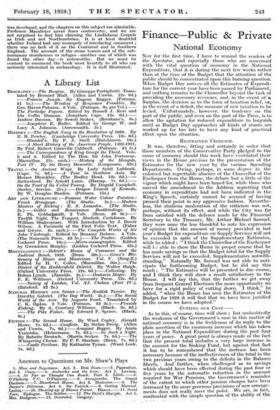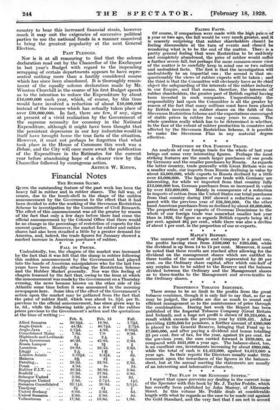Finance-Public & Private
National Economy
NOT for the first time, I have to remind the readers of the Spectator, and especially those who are concerned with the vital question of economy in the National Expenditure, that it is during the next few weeks rather than at the time of the Budget that the attention of the public should be concentrated upon this burning question. When Budget Day arrives all the Estimates of Expendi- ture for the current year have been passed by Parliament, and nothing remains to the Chancellor beyond the task of providing the necessary revenues, and, in the event of 'a Surplus, the decision as to the form of taxation relief, or, in the event of a deficit, the measure of new taxation to be levied. Unfortunately, however, the tendency on the part of the public, and even on the part of the Press, is'to allow the agitation for reduced expenditure to languish until as Budget Day approaches all kinds of stunts are worked up far too late to have any kind of practical effect upon the situation.
RESTRAINED CRITICISM.
It was, therefore, fitting and certainly in order that those members of the Conservative Party pledged to the cause of economy should this week have ventilated their views in the House precious to the presentation of the Estimates for the new year by the various Spending Departments. Owing, perhaps, in some degree to the enforced but regrettable absence of the Chancellor of the Exchequer from the House, the debate lost a little of the vigour which might have been hoped for, while those who moved the amendment to the Address regretting that economy in expenditure had not been indicated in the King's Speech, certainly cannot be accused of having pressed their point in any aggressive fashion. Neverthe- less, the studious moderation of the criticism was not, perhaps, without its effect, and while the City was far from satisfied with the defence made by the Financial Secretary to the Treasury, Mr. Arthur Michael Samuel, they were none the less thankful to note his expression of opinion that the amount of money provided in last year's Budget for expenditure on Supply Services will not be exceeded in spite of the Supplementary Estimates, while he added : " I think the Chancellor of the Exchequer will li able to show the House in proper course that he has made savings so that the Budget total for the Supply Services will not be exceeded, Supplementaries notwith- standing." Naturally Mr. Samuel was not able to anti- cipate the forthcoming Budget, but he did say this much : " The Estimates will be presented in due course, and I think they will show a result satisfactory to the House. I will say this, that the further we get away from frequent General Elections the more opportunity we have for a rigid policy of cutting down. I think," he added, " when the House has seen the Estimates of the Budget for 1928 it will find that we have been justified in the course we have adopted."
CUTTING OUR COAT
As to this, of course, time will show ; but undoubtedly the weakness of the Government's case in this matter of national economy is in the feebleness of its reply to the plain assertion of the enormous increase which has taken place in the National Expenditure during the past four years of peace. A great point is always made of the fact that the present total includes a very large increase .in the amount for the Sinking Fund, but against that fact it has to be remembered that the increase has been necessary because of the ineffectiveness of the total in the two previous years owing to the deficits in the Balance Sheets. And further, when challenged as to savings which should have been effected during the past four or five years by the automatic reduction in the amount required for War Pensions, the Government's reminder of the extent to which other pension charges have been increased by the More generous provisions of new arrange- ments does not really meet the point. We are, in fact, confronted with the simple question of the ability of the country to bear this increased financial strain, however much it may suit the exigencies of successive political parties to use the national funds in a manner conceived to bring the greatest popularity at the next General Election. - _ .
PAST PLEDGES.
Nor is it at all reassuring' to find that the solemn declaration read but by the Chancellor of the Exchequer in last year's Budget with regard to the impending scrapping of certain departments appears to have repre- sented nothing more than a hastily .. considered course which has since been abandoned. It is thoroughly remin- iscent of the equally solemn declaration made by Mr. Winston Churchill in the course of his first Budget speech as to the intention to reduce the Expenditure by about 110,000,000 each year,, which, of course, by this time would have involved a reduction of about £40,000,000 instead of the increase which has actually taken place of over £30,000,000. In fact, there are few, if any, signs at present of a vivid realization by the Government of the supreme necessity for economy in the National Expenditure, although it might have been thought that the persistent depression in our key industries would in itself have brought home the true facts of the situation. However, it must not perhaps be forgotten that what took place in the House of Commons this .week was a Debate, and the City will once more await the publication of the Expenditure in the Estimates for the current year before abandoning hope of a clearer view by the Chancellor followed by courageous action.
ARTHUR W. KIDDY.







































 Previous page
Previous page